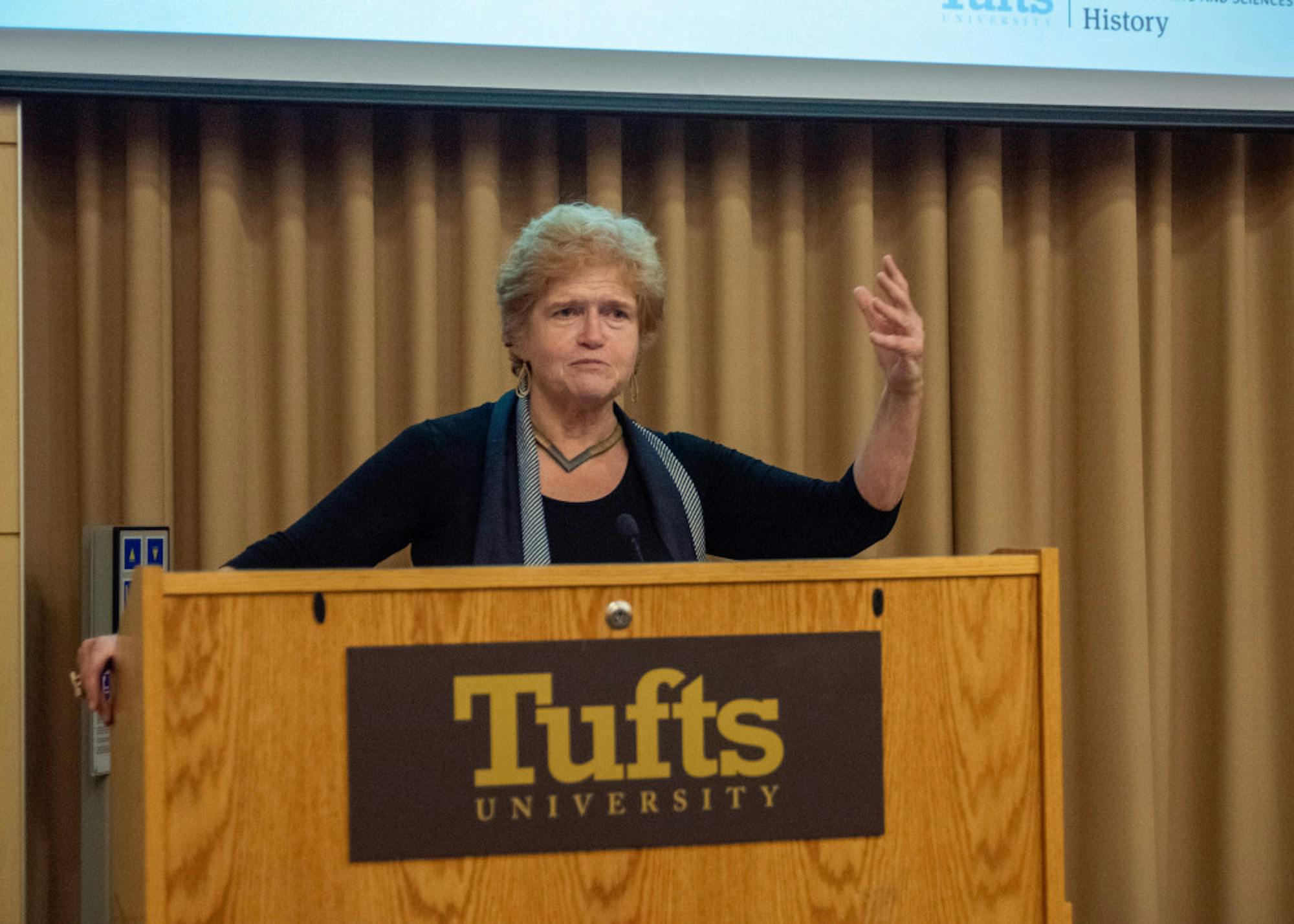Deborah Lipstadt, Dorot professor of modern Jewish history and Holocaust studies at Emory University, was hosted by Tisch College, the School of Arts and Sciences’ Dean’s Office and the history department on Tuesday evening in the ASEAN Auditorium in the Cabot Intercultural Center, as part of the School of Arts and Sciences’ Dean’s Lecture Series.
The guest lecture, titled “Antisemitism: Here and Now” took after Lipstadt’s most recent book of the same name, in which she discussed the history, features and variations of modern antisemitism.
Lipstadt is an esteemed Holocaust historian who gained notoriety from her success in the 1996 English libel case David Irving v. Penguin Books and Deborah Lipstadt and the 2016 feature film based upon it called "Denial." Lipstadt's visit coincidentally followed an incident of antisemitism on campus, in which a swastika was found on the door of a Jewish student Sunday evening.
Tufts University President Anthony Monaco, who was not originally in the program of the event, welcomed the audience by reiterating some points he made in an email sent to members of the Tufts community that morning.
“I’m heartened to see all of you here this afternoon. Your presence here today is a reminder that our university community will not let itself by expressions of bigotry, prejudice or hate,” Monaco said. “And I’m glad that we will have this opportunity to learn together.”
After introductions by Dean of the School of Arts and Sciences James Glaser and of the history department chair James Rice, Lipstadt began by outlining a brief history of antisemitism, from the Middle Ages to present.
“It has its roots in the New Testament, in the way in which the New Testament was taught and interpreted and applied, particularly during the Middle Ages,” Lipstadt said. “It may not have been so, but that’s the way it was used.”
Lipstadt described the current societal climate as “a perfect storm of antisemitism,” attributing a confluence of political and social factors for the recent rise in antisemitism around the world.
Lipstadt then defined key features of antisemitic rhetoric that persist regardless of the background of those employing it.
"One, money; something to do with ... power, the power to use those finances in a nefarious, malicious way," Lipstadt said. "And that we might call intellect, but in this context, it would be better to describe it as cunning."
Lipstadt blamed in part the language used by those with political power for recent acts of antisemitism, referring to Sunday's incident where a student found a swastika attached to their door.
“I do think that with [President Donald Trump’s] rhetoric and with his comments, he enables antisemitism,” Lipstadt said. “He makes those people feel it’s okay to put a swastika on the door.”
Lipstadt clarified that she believed it was less important whether or not a political leader were themselves antisemitic or racist than whether or not their language enabled others to carry out acts of hatred.
As a result, Lipstadt asserted that antisemitism is prevalent on both sides — and especially the extremes — of the political spectrum.
"We see it on the right, white supremacists, white nationalists, and not just that far over," Lipstadt said. "And we see it on the left. Think about ... what you're seeing in the British Labour Party."
Antisemitic rhetoric manifests itself in different sources on opposing sides of the political spectrum, Lipstadt elaborated.
“There it is so clear, on one side, it tends to be more violent,” Lipstadt said, referring to white nationalists on the far American right. "On the other side, it tends to be more institutional, and we see it from other sources."
Lipstadt characterized the danger associated with the rise of antisemitism in a country like the U.S. as a conspiracy theory.
“[Antisemitism] suggests, it argues, it posits that there is a group in our society controlling immigration, the banks, judges, FBI, CIA, media,” Lipstadt said. "The minute you believe in conspiracy theory ... you begin to lose faith in those democratic institutions, which are at the heart of the society."
Dr. Patricia Heberer Rice, moderator of the question and answer period that followed and director of the office of the senior historian at the United States Holocaust Memorial Museum, described her reaction to the argument of holocaust deniers as a distinctly antisemitic conspiracy theory.
“It hit me like a thunder clap that no one ever said, the Germans didn't kill the gypsies or these other groups,” Rice said. "It's all having to do with the Jews."
Ben Shapiro, former co-president of Tufts Friends of Israel, shared with Lipstadt his reflection on his experiences with antisemitic incidents on campus.
“As of two days ago with the swastika on the student’s door, that marks there being an antisemitic attack at least once in all four of the years that I've been here,” Shapiro, a senior, said.
Freddie Birnbaum, executive vice president of Tufts Hillel's student organization, emphasized the importance of Lipstadt’s visit so soon after the antisemitic incident on campus.
“For a lot of the students in the room, it provided more education and context to what’s going on a larger scale and a new way to think about and talk about what’s happening here,” Birnbaum, a senior, said.
Jonah Greene added that pride in his identity was critical for him in light of recent events.
“It’s about we’re going to have a positive response ... the Jewish community here will continue being strong even in some adversity,” Greene, a senior, said.
Visiting Holocaust historian delivers lecture on antisemitism

09/17/2019 - Medford/Somerville, MA - Deborah E. Lipstadt, Dorot Professor of Modern Jewish History and Holocaust Studies at Emory University, discusses history and characteristics of anti-Semitism in ASEAN auditorium on Sept. 17, 2019.





